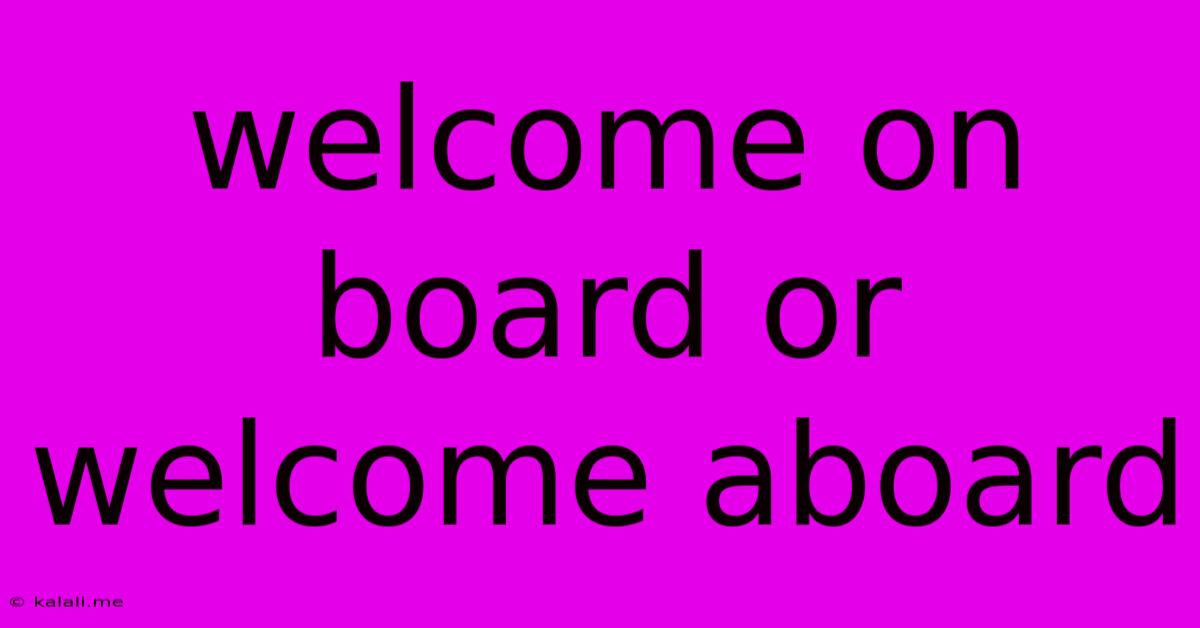Welcome On Board Or Welcome Aboard
Kalali
May 22, 2025 · 3 min read

Table of Contents
Welcome On Board vs. Welcome Aboard: Which is Correct?
Choosing between "welcome on board" and "welcome aboard" can feel surprisingly tricky! While both phrases express a warm greeting to a newcomer, there's a subtle difference in their usage that determines which is more appropriate in different contexts. This guide will clarify the nuances, ensuring you always use the correct phrase.
Meta Description: Learn the difference between "welcome on board" and "welcome aboard," understanding their subtle nuances and when to use each phrase correctly for effective communication.
Understanding the Nuances
The core meaning of both phrases is identical: to extend a welcoming greeting to someone joining a team, project, or organization. However, the preposition makes a difference in the implied context.
-
"Welcome aboard" is the more concise and traditionally preferred option. It's a shorter, punchier phrase that works well in most situations. Think of it as a more established, nautical-themed greeting, evoking imagery of stepping onto a ship. It's versatile and suitable for both formal and informal settings.
-
"Welcome on board" is grammatically correct and frequently used, particularly in modern contexts. It's slightly more literal, emphasizing the act of physically joining something. While perfectly acceptable, it might feel slightly more formal or even verbose compared to "welcome aboard."
When to Use Each Phrase
While both phrases are largely interchangeable, consider these guidelines to help you choose the most appropriate option:
Use "Welcome aboard" when:
- You want a concise and impactful greeting: This phrase is shorter, more memorable, and often feels more natural in casual conversations.
- You're referencing a team or project: It succinctly conveys the sense of joining a group effort.
- The context is informal: It's a perfectly acceptable phrase for emails, informal presentations, and casual workplace interactions.
- You want a traditional, nautical feel: This phrasing retains a classic, welcoming tone with historical roots in seafaring.
Use "Welcome on board" when:
- You want to emphasize the act of joining: This phrase highlights the physical or metaphorical act of becoming a part of something.
- The context is slightly more formal: It may be a suitable choice for official announcements or formal emails.
- You're describing a detailed onboarding process: This phrase subtly hints at a more structured integration process.
Examples
Here are some examples to illustrate the usage:
"Welcome aboard!"
- "Team, I'd like you to meet our newest member, Sarah. Welcome aboard!" (Informal, team setting)
- "Congratulations on your new role! Welcome aboard!" (Informal, congratulatory message)
- "Welcome aboard the project, everyone. Let's make this a success!" (Informal, project kickoff)
"Welcome on board!"
- "We're thrilled to have you join our company. Welcome on board, and we look forward to a successful journey together." (Slightly more formal, company welcome)
- "Thank you for accepting our offer. Welcome on board, and we'll be in touch soon regarding your onboarding process." (Formal, job acceptance)
- "Welcome on board the committee. Your expertise will be invaluable." (Formal, committee meeting)
Conclusion
Ultimately, both "welcome aboard" and "welcome on board" are perfectly acceptable and widely understood. The choice often comes down to personal preference, context, and desired tone. However, remembering the subtle nuances discussed above will help you choose the option that best suits your specific communication needs. Focus on clarity and a welcoming tone – your message will resonate regardless of which phrase you choose.
Latest Posts
Latest Posts
-
Getting Rid Of Mold On Bathroom Ceiling
May 22, 2025
-
Beer In The Freezer How Long
May 22, 2025
-
The Rabbit Is Out Of The Hat
May 22, 2025
-
French Movies With English And French Subtitles
May 22, 2025
-
Wiring Diagram For Nest Heat Link
May 22, 2025
Related Post
Thank you for visiting our website which covers about Welcome On Board Or Welcome Aboard . We hope the information provided has been useful to you. Feel free to contact us if you have any questions or need further assistance. See you next time and don't miss to bookmark.